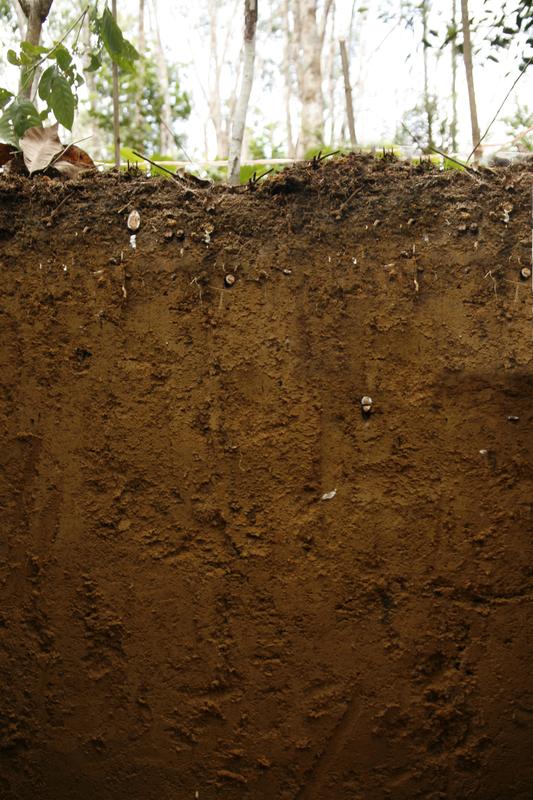Tropical deforestation releases large amounts of soil carbon

Soil under a mature rubber plantation in Jambi Province, Sumatra, Indonesia. Photo: University of Goettingen
Deforestation of natural tropical forests for the establishment of oil palm, rubber and cacao plantations causes large amounts of carbon to be released into the atmosphere.
Scientists at the University of Göttingen have shown that up to 50 percent of the carbon stored in the soil can be lost when replacing tropical forests with these types of plantations. In the scientific journal PNAS, they call on the IPCC to update their carbon accounting guidelines to reflect these large carbon losses.
About 30 percent of global soil organic carbon is stored in the top three meters of soils in the humid tropics. These soils have rapid organic matter decomposition rates. Accordingly, this enormous amount of carbon is at particular risk when carbon-rich forests are cut down and replaced.
Forestry scientists at Göttingen University established a total of 86 research plots across the humid tropics in Indonesia, Cameroon and Peru and compared the carbon contents of natural forest soils with neighbouring tree plantations managed by small-holder farmers.
“Until now it was assumed that establishing such plantations did not cause soil carbon stock losses,” the authors of the study say. “However, our study showed that deforestation for tree plantations results in a loss of natural organic carbon pools of up to 50 percent.”
Carbon is primarily lost from the burning of vegetation after land clearing and the decomposition of organic matter, as well as lower organic material inputs into the soil from the newly established tree crops.
The key variable that predicts the magnitude of soil carbon losses is the amount of soil carbon present in the original forest. “The higher the initial soil carbon stocks, the greater the carbon losses later,” the scientists say.
From their results, they advise the IPCC to update their guidelines to account for these large carbon losses. Moreover, land-use management policies should protect natural forests in tropical countries on carbon-rich mineral soils to minimize soil carbon losses.
Original publication: Oliver van Straaten et al. Conversion of lowland tropical forests to tree cash crop plantations loses up to one-half of stored soil organic carbon. Proceedings of the National Academy of Sciences of the USA 2015. Doi: 10.1073/pnas.1504628112.
Contact:
Prof. Dr. Edzo Veldkamp
University of Goettingen
Faculty of Forest Sciences and Forest Ecology – Soil Science of Tropical and Subtropical Ecosystems
Büsgenweg 2, 37077 Göttingen, Germany, Phone: +49 551 39-7339
Email: eveldka@gwdg.de, Web: http://www.uni-goettingen.de/de/81316.html
Dr. Oliver van Straaten
University of Goettingen
Faculty of Forest Sciences and Forest Ecology – Soil Science of Tropical and Subtropical Ecosystems
Büsgenweg 2, 37077 Göttingen, Germany, Phone: +49 551 39-33513
Email: ostraat@gwdg.de, Web: http://www.uni-goettingen.de/de/187890.html
Media Contact
All latest news from the category: Agricultural and Forestry Science
Newest articles

First-of-its-kind study uses remote sensing to monitor plastic debris in rivers and lakes
Remote sensing creates a cost-effective solution to monitoring plastic pollution. A first-of-its-kind study from researchers at the University of Minnesota Twin Cities shows how remote sensing can help monitor and…

Laser-based artificial neuron mimics nerve cell functions at lightning speed
With a processing speed a billion times faster than nature, chip-based laser neuron could help advance AI tasks such as pattern recognition and sequence prediction. Researchers have developed a laser-based…

Optimising the processing of plastic waste
Just one look in the yellow bin reveals a colourful jumble of different types of plastic. However, the purer and more uniform plastic waste is, the easier it is to…



